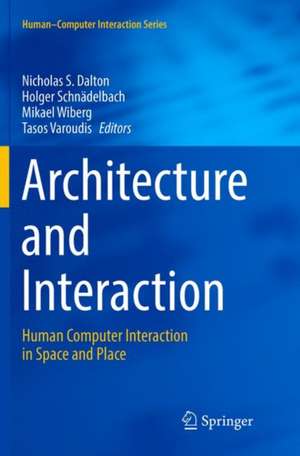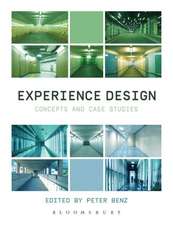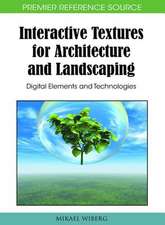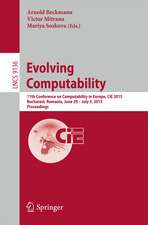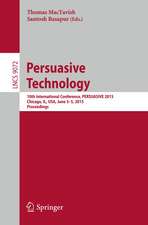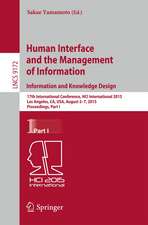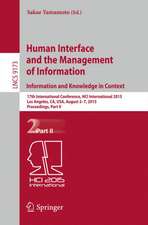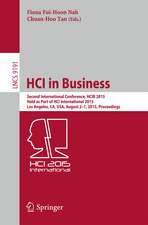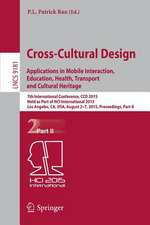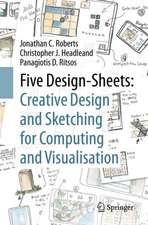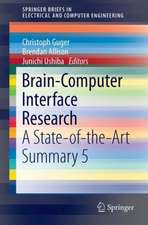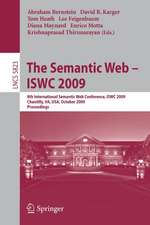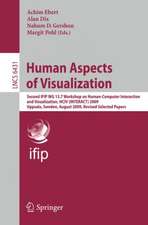Architecture and Interaction: Human Computer Interaction in Space and Place: Human–Computer Interaction Series
Editat de Nicholas S. Dalton, Holger Schnädelbach, Mikael Wiberg, Tasos Varoudisen Limba Engleză Paperback – 31 mai 2018
Architectureand Interaction is aimed at researchers and practitioners in the field of computing who want togain a greater insight into the challenges of creating technologies in thebuilt environment and those from the architectural and urban design disciplineswho wish to incorporate digital information technologies in future buildings.
| Toate formatele și edițiile | Preț | Express |
|---|---|---|
| Paperback (1) | 599.95 lei 38-44 zile | |
| Springer International Publishing – 31 mai 2018 | 599.95 lei 38-44 zile | |
| Hardback (1) | 659.97 lei 3-5 săpt. | |
| Springer International Publishing – 22 iun 2016 | 659.97 lei 3-5 săpt. |
Din seria Human–Computer Interaction Series
- 20%
 Preț: 655.85 lei
Preț: 655.85 lei - 20%
 Preț: 309.27 lei
Preț: 309.27 lei - 20%
 Preț: 375.54 lei
Preț: 375.54 lei - 20%
 Preț: 644.48 lei
Preț: 644.48 lei - 20%
 Preț: 667.75 lei
Preț: 667.75 lei - 20%
 Preț: 664.44 lei
Preț: 664.44 lei - 20%
 Preț: 1164.84 lei
Preț: 1164.84 lei - 20%
 Preț: 817.55 lei
Preț: 817.55 lei - 20%
 Preț: 657.16 lei
Preț: 657.16 lei - 20%
 Preț: 645.31 lei
Preț: 645.31 lei - 20%
 Preț: 938.66 lei
Preț: 938.66 lei - 15%
 Preț: 658.05 lei
Preț: 658.05 lei - 20%
 Preț: 822.51 lei
Preț: 822.51 lei - 20%
 Preț: 654.21 lei
Preț: 654.21 lei - 20%
 Preț: 994.26 lei
Preț: 994.26 lei - 20%
 Preț: 1621.89 lei
Preț: 1621.89 lei - 20%
 Preț: 991.60 lei
Preț: 991.60 lei - 20%
 Preț: 783.46 lei
Preț: 783.46 lei - 20%
 Preț: 1175.42 lei
Preț: 1175.42 lei - 20%
 Preț: 659.97 lei
Preț: 659.97 lei - 20%
 Preț: 219.15 lei
Preț: 219.15 lei - 20%
 Preț: 334.86 lei
Preț: 334.86 lei - 20%
 Preț: 969.85 lei
Preț: 969.85 lei - 20%
 Preț: 642.19 lei
Preț: 642.19 lei - 20%
 Preț: 314.39 lei
Preț: 314.39 lei - 20%
 Preț: 661.14 lei
Preț: 661.14 lei - 20%
 Preț: 995.89 lei
Preț: 995.89 lei - 20%
 Preț: 752.59 lei
Preț: 752.59 lei - 20%
 Preț: 990.30 lei
Preț: 990.30 lei - 20%
 Preț: 990.12 lei
Preț: 990.12 lei - 20%
 Preț: 336.21 lei
Preț: 336.21 lei - 20%
 Preț: 334.71 lei
Preț: 334.71 lei - 20%
 Preț: 312.62 lei
Preț: 312.62 lei - 20%
 Preț: 994.92 lei
Preț: 994.92 lei - 20%
 Preț: 331.74 lei
Preț: 331.74 lei - 20%
 Preț: 646.80 lei
Preț: 646.80 lei - 20%
 Preț: 334.86 lei
Preț: 334.86 lei - 20%
 Preț: 994.40 lei
Preț: 994.40 lei - 20%
 Preț: 329.76 lei
Preț: 329.76 lei - 20%
 Preț: 332.24 lei
Preț: 332.24 lei - 20%
 Preț: 992.11 lei
Preț: 992.11 lei - 20%
 Preț: 650.40 lei
Preț: 650.40 lei - 20%
 Preț: 337.00 lei
Preț: 337.00 lei - 20%
 Preț: 332.39 lei
Preț: 332.39 lei - 20%
 Preț: 1279.86 lei
Preț: 1279.86 lei - 15%
 Preț: 636.12 lei
Preț: 636.12 lei - 20%
 Preț: 336.67 lei
Preț: 336.67 lei - 20%
 Preț: 1000.70 lei
Preț: 1000.70 lei - 20%
 Preț: 645.14 lei
Preț: 645.14 lei
Preț: 599.95 lei
Preț vechi: 749.93 lei
-20% Nou
Puncte Express: 900
Preț estimativ în valută:
114.84€ • 124.78$ • 96.53£
114.84€ • 124.78$ • 96.53£
Carte tipărită la comandă
Livrare economică 17-23 aprilie
Preluare comenzi: 021 569.72.76
Specificații
ISBN-13: 9783319807072
ISBN-10: 3319807072
Pagini: 343
Ilustrații: X, 343 p. 82 illus., 66 illus. in color.
Dimensiuni: 155 x 235 mm
Ediția:Softcover reprint of the original 1st ed. 2016
Editura: Springer International Publishing
Colecția Springer
Seria Human–Computer Interaction Series
Locul publicării:Cham, Switzerland
ISBN-10: 3319807072
Pagini: 343
Ilustrații: X, 343 p. 82 illus., 66 illus. in color.
Dimensiuni: 155 x 235 mm
Ediția:Softcover reprint of the original 1st ed. 2016
Editura: Springer International Publishing
Colecția Springer
Seria Human–Computer Interaction Series
Locul publicării:Cham, Switzerland
Cuprins
Introduction.- Part I:Interdisciplinary Dialogue.- Applying HCI Methods and Concepts to ArchitecturalDesign (or Why Architects could use HCI, Even if They Don’t Know It).- What Is It about Space that is Important inInteraction? Let’s Take the World From a Situated Point of View.- Part II:Approaching Interaction in Space .- Supporting Fluid Transitions in InnovativeLearning spaces: Architectural, Social and Technological Factors.- CreativeWorkplace Alchemies: Individual Workspaces and Collaboration Hotspots.- Gettingit Going: Explorations at the Intersection of Moving Bodies, InformationTechnology & Architecture.- Measuring Interaction in Workplaces.- Part III:Going Abstract about the Concrete.- Community Is the Message: Viewing NetworkedPublic Displays through McLuhan’s Media Theory.- Embodied Interactions withAdaptive Architecture.- Part IV: Activating Spaces.- Mapping the Intangible: OnAdaptivity & Relational Prototypingin Architectural Design.-An InteractiveSimulation Environment for Adaptive Architectural Systems.- Robotic Building asPhysically Built Robotic Environments and Robotically Supported BuildingProcesses.- Part V: Sights and Magnifications.- Northern Urban Lights: EmplacedExperiences of Urban Lighting as Digital Augmentation.- Reading and Responding to the DigitalFootprints of Mobile Visitors.- OnPotential Application of Interaction Design for Placemaking.
Textul de pe ultima copertă
Ubiquitous computing has a vision of information and interaction being embedded in the world around us; this forms the basis of this book. Built environments are subjects of design and architects have seen digital elements incorporated into the fabric of buildings as a way of creating environments that meet the dynamic challenges of future habitation.
Methods for prototyping interactive buildings are discussed and the theoretical overlaps between both domains are explored. Topics like the role of space and technology within the workplace as well as the role of embodiment in understanding how buildings and technology can influence action are discussed, as well as investigating the creation of place with new methodologies to investigate the occupation of buildings and how they can be used to understand spatial technologies.
Architecture and Interaction is aimed at researchers and practitioners in the field of computing who want to gain a greater insight into the challenges of creating technologies in the built environment and those from the architectural and urban design disciplines who wish to incorporate digital information technologies in future buildings.
Architecture and Interaction is aimed at researchers and practitioners in the field of computing who want to gain a greater insight into the challenges of creating technologies in the built environment and those from the architectural and urban design disciplines who wish to incorporate digital information technologies in future buildings.
Caracteristici
Agenda-setting book on the overlap between Architecture and Human Computer Interaction Presents work on architectural approaches to the of design of digital environments Looks at the incorporation of HCI principles in architecturaldesign Brings together a diverse range of multi-disciplinaryexperts from this emerging research area
